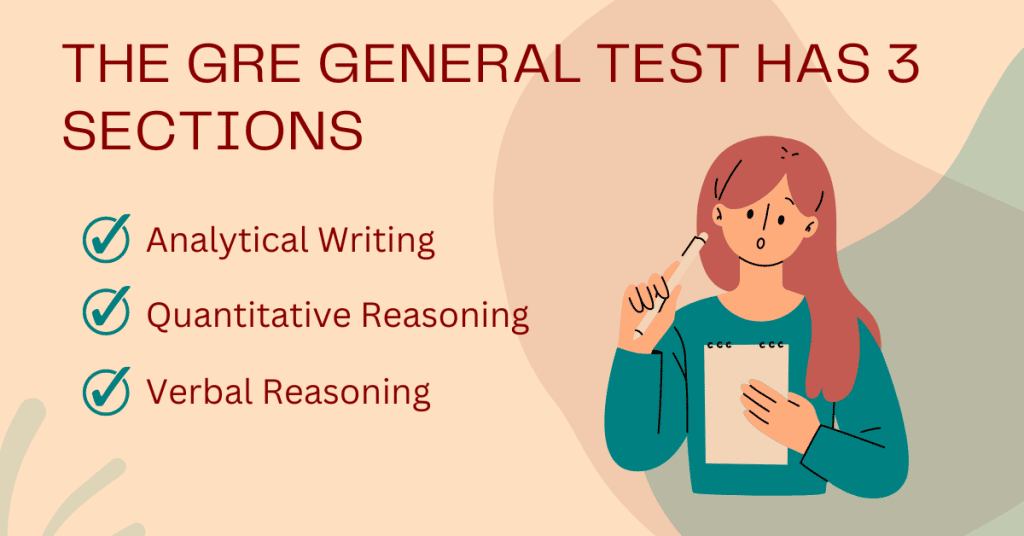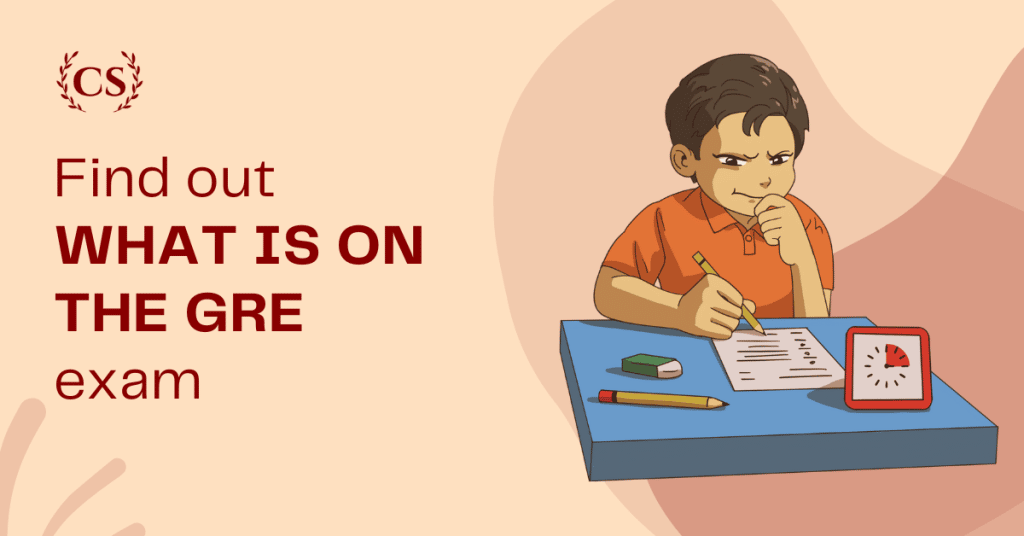Many graduate schools use results from the GRE test scores to determine if the student applying to a program proves a fit. So you might wonder what is on the GRE and what it is. It is an entrance exam that shows your academic understanding of what you wish to major in and other critical factors, as will be discussed later.
A high Graduate Record Examination (GRE) test score, coupled with the student’s academic record as well as other supporting materials will be required by the school of choice. These are some of the qualifying factors to join the graduate programs.
However, taking the test is not advisable if you still have no idea what you wish to major in. Also, the GRE test is not one for the faint-hearted, and you cannot assume to prepare for it last minute. The test requires serious commitment and enough preparedness before it’s sitting. You can get started on your GRE preparation journey here.
That said, with the correct information regarding this test, it will be much easier to know what is on the gre and how to prepare for it adequately.
What is the GRE General Test?
The GRE general test is a standardized examination by the Educational Testing Service(ETS). The trial is set to gauge the level of critical thinking of those willing to join graduate school.
It’s also a ticket to accessing graduate programs in business or law schools.
Students are required to take this test as it portrays their depth of understanding in what they choose as their major. The test also measures the student’s skills in three crucial areas like analytical writing, verbal reasoning, and quantitative reasoning.
These are skills students acquire over time, and students possessing such skills are in high positions to land graduate school opportunities.

However, some programs also require the student to take a GRE subject test.
What are the GRE Subject Tests?
The GRE subject tests show your understanding of a particular subject, depending on your major. Graduate schools take note of these GRE test scores, which help them measure your knowledge in the field. A good performance in the subject test places you in a better position to qualify for the placement.
The tests are intended for students with prior knowledge of the subject, probably in their undergraduate studies.
That’s because it becomes easier for students with background information on the subject to handle what is on the gre test. It’s also a sign of your passion for the subject or your aim to explore it more. The disciplines include;
- Chemistry
- Mathematics
- Physics
- Psychology
- Biology
- Literature
The ETS provides digital revision materials to help you prepare extensively for the tests. Here are some details to help you understand what is on the GRE.
Chemistry
The test has approximately 130 multiple-choice questions. The questions cover four major chemistry topics, analytical, inorganic, organic, and physical chemistry. Some good revision on these four topics and proper practice will place you at the forefront of your competitors in the position at your ideal school.
Biology
The test covers three major categories, including cellular and molecular biology, organismal biology, evolution, and ecology biology. A good understanding of these topics prepares you adequately for what is on the GRE test. The test has approximately 180 questions
Physics
The test includes at least 100 five-choice questions, some grouped in sets. The main areas of focus include classical mechanics, electromagnetism, thermodynamics, statistical mechanics, atomic physics, laboratory methods, quantum mechanics, optic and wave phenomena, special relativity, and specialized topics. The secret to winning physics tests is a good understanding of the topics, research, and practice.
Mathematics
The mathematics test includes 66 multiple-choice questions. Most of these questions borrow broadly from undergraduate courses. About 50% focuses on calculus, 25% on algebra, and the other 25% on additional topics. Like physics, you have no choice but to invest your time in practicing until you get it right before the test day.
Literature
The Literature in English GRE Test has approximately 230 multiple-choice questions. These questions encompass poetry, drama, criticism, language history, biography, literary theory, short story, and novel. Most people might term this as one of the easiest tests. However, if you don’t read extensively and understand all the details, you will likely experience difficulty on your test day.
Psychology
It’s a test that includes 205 multiple-choice questions from 6 different topics. These psychology classes tested include cognitive, clinical, biological, developmental, social, measurement and methodology. If you are a psychology lover and invest in researching these topics, you will surely excel in your test.
| Test | Number of Questions |
| Chemistry | 130 |
| Biology | 180 |
| Physics | 100 |
| Mathematics | 66 |
| Literature | 230 |
| Psychology | 205 |
How Does the GRE General Test Compare to a GRE Subject Test?
Most people still don’t know what to pick between the GRE general and subject tests. However, the general test primarily measures an individual’s level of critical thinking necessary for various disciplines. On the other hand, the subject test measures an individual’s knowledge in a particular academic field.
In most cases, the university will require a GRE subject test score if you wish to major in a particular field. As for the general test score, it will be proof of your general reasoning and knack of abilities to qualify you for various programs.
The two are equally critical depending on what you are applying for and the graduate school’s requirements.
Additionally, the two tests take place at different times of the year. You can book and sit for the general test any time of the year, while the subject test only happens three months a year. The three months include April, September, and October
Also, when it comes to the test timing, students set their time limit for the subject tests, while general tests already have a pre-set time limit.
Lastly, it’s crucial to note that, as much as the tests can run co-currently at some point in the year, it’s advisable not to take the GRE general test with the subject test. Take time to rest after finishing one test before embarking on the other one. The two tests require enough time to prepare and understand all the content individually.
What is on the GRE General Test?
The GRE general test seeks to showcase an individual’s level of critical thinking required for various programs in graduate school. The test focuses majorly on developing verbal reasoning, quantitative reasoning, and analytical writing skills.
Analytical writing section
An analytical writing assessment measures your critical thinking and analytical skills. These are skills that help you observe, interpret and understand data in a much simpler way.
Quantitative reasoning section
As for quantitative reasoning, the test measures your understanding and interpretation of mathematical models and quantitative information.
Verbal reasoning Section
Verb reasoning test ensures you understand a statement and its interpretation. It helps measure skills that help you understand and interpret concepts in language form or words.
What Skills will you be tested on in the GRE?
Skills tested in the analytical writing section
First, this section measures your ability to discuss ideas and back them up with relevant examples to contribute to your analytical writing skills.
It also tests your ability to analyze claims based on the evidence.
Additionally, it also helps measure your ability to evaluate written material.
Besides that, it also measures your effectiveness in understandably explaining complex ideas.
Skills tested in the quantitative reasoning section
In order to develop your quantitative reasoning, the test measures your ability to understand and analyze quantitative data.
It also gauges the test takers’ ability to use mathematical models to solve problems.
The test also measures your algebra, geometry, arithmetic, and data analysis concepts.
Skills tested in the verbal reasoning section
The section measures your ability to analyze written materials and identify the author’s intent and assumptions.
It also helps you distinguish between major and minor points in a text, as well as understand the structure of the text.
Lastly, from the test, you can tell the relationship between words and concepts in a statement.
What questions should you expect on the GRE?
Analytical writing question types
The questions in this section focus on two crucial areas.
- Analyzing a task.Here, you are given an overview of a general issue with specific instructions on the expected response. You are then required to give your opinion based on the guidelines provided.
- Analyzing an argument.For this, you are presented with a passage representing an argument and specific instructions to guide your answer. You are then expected to give your stand in the argument within the guidelines provided.
Quantitative reasoning question types
The questions tested in this section include
- Arithmetic topics such as types of integers and their properties, arithmetic operations, and concepts like estimation, sequences of numbers, number line, and percent ratio.
- Algebra topics include operations and their exponents, factoring and simplifying algebraic expressions, and solving simultaneous equations.
- Geometry topics like circles, area, perimeter, volume, quadrilaterals, congruent and similar figures, triangles, the Pythagorean theorem, and angle measurement in degrees.
- Lastly, the test includes data analysis topics like elementary probability, conditional probability, random variables, and counting methods like combinations and Venn diagrams.
Verbal reasoning question types
The section tests in three major areas.
- Text completion. Here you are given a statement with a blank space. You are expected to pick the correct answer from the choices given.
- Sentence equivalence. Like text completion, here you have a sentence with missing data to complete it. You are expected to find the correct answer to complete the statement from the choices given.
- Reading comprehension. Here you are given a passage to read and later answer a question regarding the statement correctly.
FAQ section
Is the GRE test hard?
Compared to SAT and ACT, most people view the GRE test as one of the most challenging graduate exams. However, that’s not the You’ll pass with proper preparations from reading the revision materials given and the required practice. All you need is the commitment to understand and practice the necessary details.
What math is on the GRE
The GRE mathematics syllabus and topics revolve around calculus, algebra, and other issues like logic, algorithms, probability, statistics, combinations, and sequences. It represents mathematical models used to explain data in real life.
What is tested on the GRE
The GRE tests measure your critical thinking and knowledge in other fields like biology, chemistry, mathematics, physics, psychology, and literature.
Conclusion
GRE is a broad test that covers a variety of topics. If you want to do well, it’s important to prepare for each section accordingly. The Magoosh GRE Prep Course can help you hone your skills and knowledge so that you feel confident and prepared when test day comes around. Give the course a try today!

